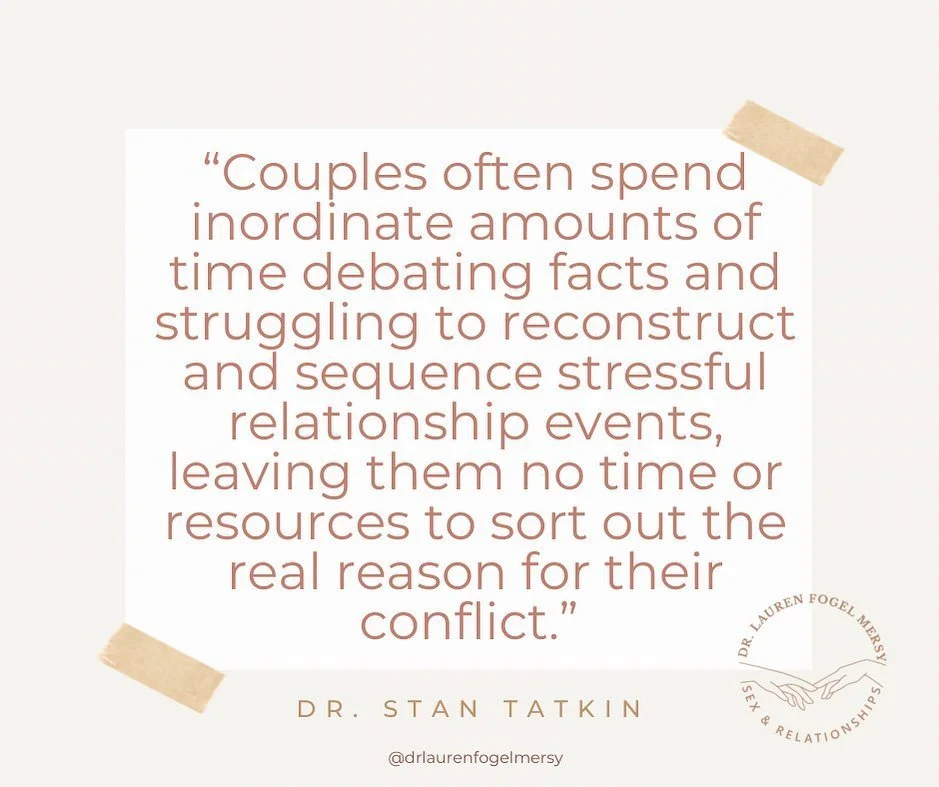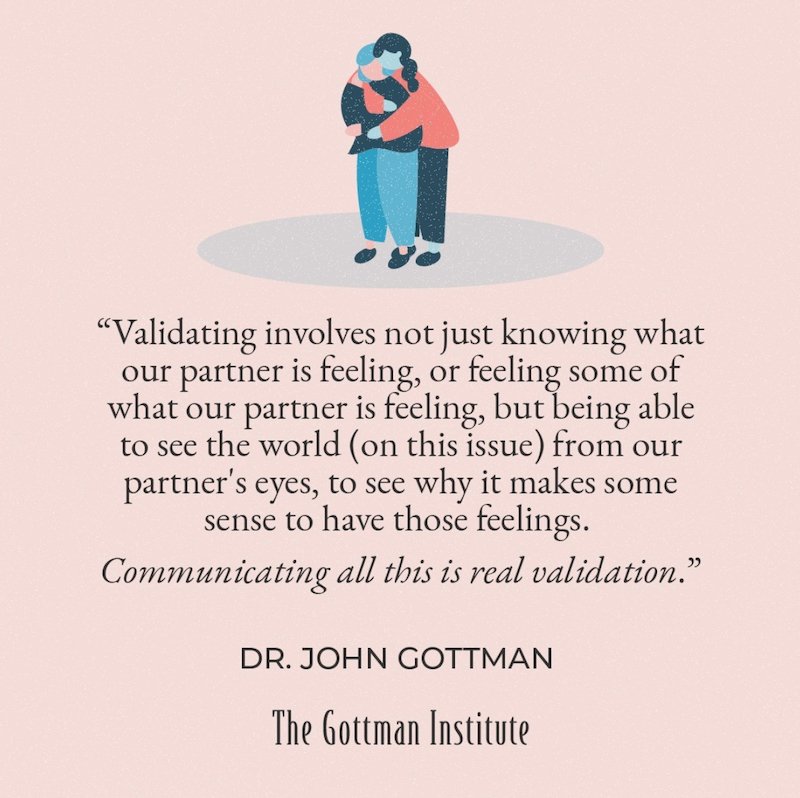Before You Correct Your Partner, Do This First
by Marissa Pomerance
We spend countless hours a day with the same person. And if we have to see them load the dishwasher KNIVES UP one more time we will spontaneously combust.
It almost doesn’t matter that they’re actually loading the dishwasher in a way they feel is right, because so much of our criticism stems from the fact that they’re just not doing it the way we would do it.
And so we pick at them.
We correct their driving when they tailgate. We gasp in disgust when we notice they left the back door unlocked overnight even after they told us they checked all the doors before bed. We belittle their insane, hormone-riddled choice of deli meat they present to us after “helping” with grocery shopping.
But. We’re doing it wrong.
And so, as with all things relationship-adjacent, we asked The Gottman Institute how to do it right.
And they told us that the key to correcting our partners, is to connect with them first: connect before you correct.
Isn’t that a great phrase? Easy to remember. Straight-forward. But it’s the execution where things get tough.
What does this mean?
To “connect before you correct” means to try and understand our partner’s experiences, perspective, and reasoning before jumping in to correct them or “fix” what we think they’re doing wrong.
Another way to describe it would be to “attune,” which is to “attend to your partner’s emotions, turn towards their attempts to interact, tolerate the differences between the two of you, understand your partner’s point of view, respond non-defensively and engage emotionally,” says Gottman Clinical Director, Dr. Don Cole.
Of course, he recognizes that sometimes “we need to ‘correct’ a negative interaction. In Gottman Method, we prefer the word ‘repair.’ All couples make mistakes and hurt one another’s feelings at times or simply have misunderstandings. When couples are attuned (connected), repair attempts (correcting negative interactions) are much more effective,” he explains.
Here’s an example of a situation when we might try to “correct” without connecting or repairing:
A couple is in a fight because Jill feels John has been working non-stop lately, and isn’t prioritizing time with the family. Jill suggests that John cares more about work than the family, while John says that’s absolutely not true, and Jill clearly doesn’t understand the pressure he’s under at work. Jill gives examples to prove her point, and tries to tell him to “just work less” or “prioritize family time.” John gives examples of how he’s carrying the larger load in the family right now, and says Jill is being unsupportive. Both are trying to prove their point, and show how the other Partner is “wrong.”
And here’s that same example, but with connection.
Jill asks John how he’s feeling about his current workload, and expresses that she can tell that John seems stressed. John admits he’s overwhelmed, and hates that he’s missing out on family time because of work. Jill asks if there’s anything she can do to support him and make family time easier, and they come up with a plan together to prioritize quality time.
When we focus on correction, or proving that we’re “right,” the conflict becomes less and less productive, and each partner moves further away from each other. “A sense of repair is impossible when we are trying to correct our partner’s memory or experience. There is usually no connection after this ‘correction,’” says Cole. But when we focus on understanding, and engage our curiosity, we may access vulnerability and emotions that deepen our connections, bringing us closer together.
Great, but how do we DO this in the moment?
Putting aside our own need to be right all the time is a good (and extremely hard) first step. But understanding why we need to be right—to prove our point, or “fix” our partner’s problems—is an even better first step. And as we’ve talked about a lot on this site, both needing to be right (and getting defensive), and trying to “fix” things come down to our own inability to sit with discomfort. Whether it’s not wanting to sit with the uncomfortable emotions of feeling ashamed and unworthy for being “wrong,” or sitting with someone else’s uncomfortable emotions (like anger or sadness), we try to “fix” their problems to make those emotions go away.
But being corrected, or told that we’re wrong/how we should fix our problems, feels terrible. “Many times, we try to offer suggestions as a way of removing or alleviating our partner’s negative feelings,” says Cole. “For example, if they are stressed out about a situation at work, we might offer a solution, hoping that it will make them feel better. However, this solution frequently contains a negative message such as, ‘If you were smarter, you would have figured it out by now,’ or ‘I don’t want to listen to this anymore, so here’s the answer.’”
This becomes even more explosive in long-term relationships. Humans are already primed for negativity, and we look for what’s wrong so we can find a solution. “However, when looking for what’s wrong in one’s partner, it becomes criticism. People on the receiving end of criticism get defensive. Criticism and defensiveness are two of the killers of a relationship. Additionally, when people communicate to their partner from a position of superiority, they have entered the realm of contempt, which is the most toxic of the four relationship killers, and is highly predictive of relation failure,” says Cole.
So, to practice connecting before we correct, Cole suggests doing these 3 things:
1. Start with validation and curiosity: “Validating your partner’s feelings makes a huge difference. The three magic words after ‘I love you’ in a relationship is ‘that makes sense.’ When each partner feels heard, understood, and validated, they often seek to hear, understand and validate us as well,” Cole says. An easy-ish way to validate their feelings is to accept their influence, which you can read more about here. When we approach their feelings and perspective with curiosity, and ask questions to better understand, we may even deepen our own understanding of our partners, instead of rushing to hasty conclusions.
2. Don’t only have tough conversations in heated moments: When we’re in a good mood, few of us ever consider sitting down and hashing out tough conversations with our partners. But that means our hardest conversations usually happen during a state of conflict, which is less productive. Instead, Cole recommends we specifically set aside time to hash out our problems. “We teach couples to do a stress-reducing conversation for 10-15 minutes per person. When the conversation has a time frame, it makes it easier to transition to other things. It is important for there to be one speaker and one listener in these conversations so that each person can be heard. When you are the listener, try asking open-ended questions that stay focused on the speaker, such as ‘What’s the worst part in this situation for you?’ ‘What are you telling yourself about you regarding this situation?’ Allow them to have their feelings around it without taking it away or telling them that’s not true,” he says.
3. Don’t run from their emotions: Often, our discomfort with our partner’s emotions is at the core of why we try to correct them, but moving through that discomfort is often the best way for us to reach a deeper level of connection and understanding. According to Cole, “being emotionally present when your partner is feeling negative is the basis of building trust with one another. When we communicate to our partner that their emotions are overwhelming us, they then feel that they must withhold those feelings rather than entrusting them to us. Empathy is very positive. ‘Yeah, I understand why your boss is driving you crazy.’ ‘It makes sense that you would be frustrated with this situation.’ Many times, as they process verbally, they are then able to see the situation differently themselves and come up with their own solution to it or realize that there is no quick solution. Talking about it soothes them.”
Marissa Pomerance is the Managing Editor of The Candidly. She’s a Los Angeles native and lover of all things food, style, beauty, and wellness. You can find more of her articles here.


















